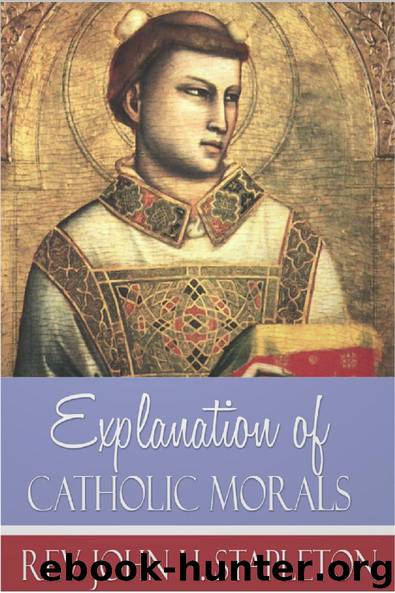Explanation of Catholic Morals by John H. Stapleton

Author:John H. Stapleton
Language: eng
Format: epub
Tags: catholic, church, view, catholicism, christian, religion, christianity, sin, sins
ISBN: 9781781664940
Publisher: Andrews UK Limited 2012
Published: 2012-06-13T00:00:00+00:00
CHAPTER LI.
WORSHIP OF SACRIFICE.
WE Catholics contend, and our contention is based on a law of nature that we glean from the history of man, that sacrifice is the soul of religion, that there never was a universally and permanently accepted religion - and that there cannot be any such religion - without an altar, a victim, a priest, and a sacrifice. We claim that reason and experience would bear us out in this contention, even without the example and teaching and express commands of Jesus Christ, who, in founding a new and the only true religion, Himself offered sacrifice and left a sacrifice to be perpetually offered in His religion; and that sacrifice constitutes the high worship we owe to the Creator.
It is our conviction that, when man came into the presence of the Almighty, his first impulse was to speak to Him, and his first word was an act of adoration. But human language is a feeble medium of communication with the Almighty. Man talks to man. To talk with God, he sought out another language; and, as in the case of Adam's sons, he discovered in sacrifice a better and stronger mode of expressing his religious feelings. He therefore offered sacrifice, and sacrifice became the language of man in his relations with the Deity.
In its simplest definition, sacrifice is the offering to God of a victim, by one authorized for that task. It supposes essentially the destruction of the victim; and the act is an eloquent acknowledgment, in language that is as plain as it possibly can be made, that God is the supreme Lord of life and death, that all things that exist come from Him, and revert to Him as to their natural end.
The philosophy of sacrifice is that man, in some manner or other, had incurred the wrath of the Almighty. The pagan could not tell hi just what his offense consisted; but there is nothing plainer than the fact that he considered himself under the ban of God's displeasure, and that sin had something to do with it; and he feared the Deity accordingly. We know that original sin was the curse under which he labored.
Whatever the offense was, it was in the flesh, the result of weakness rather than malice. There was something in his nature that inclined to evil and was responsible for sin. The better part tried to serve, but the inferior man revolted. Flesh, therefore, was wicked and sinful; and since all offense must be atoned for, the flesh should pay the penalty of evil. The wrath of God could be appeased, and sacrifice was the thing that could do it.
Another thing most remarkable among those who worshiped by sacrifice in the early times, is that they believed firmly in the reversibility of merit, that is, that the innocent could atone for the wicked. Somehow, they acquired the notion that stainless victims were more agreeable to God than others. God sanctioned this belief among the Jews, and most strikingly on the hill of Calvary.
Download
This site does not store any files on its server. We only index and link to content provided by other sites. Please contact the content providers to delete copyright contents if any and email us, we'll remove relevant links or contents immediately.
Resisting Happiness by Matthew Kelly(3341)
The Social Psychology of Inequality by Unknown(3031)
Day by Elie Wiesel(2783)
Designing Your Life by Bill Burnett(2746)
The Giving Tree by Shel Silverstein(2344)
Human Design by Chetan Parkyn(2073)
The Supreme Gift by Paulo Coelho(1978)
Angels of God: The Bible, the Church and the Heavenly Hosts by Mike Aquilina(1969)
Jesus of Nazareth by Joseph Ratzinger(1811)
Hostage to the Devil by Malachi Martin(1803)
Augustine: Conversions to Confessions by Robin Lane Fox(1772)
7 Secrets of Divine Mercy by Vinny Flynn(1746)
Dark Mysteries of the Vatican by H. Paul Jeffers(1723)
The Vatican Pimpernel by Brian Fleming(1703)
St. Thomas Aquinas by G. K. Chesterton(1634)
Saints & Angels by Doreen Virtue(1605)
The Ratline by Philippe Sands(1579)
My Daily Catholic Bible, NABRE by Thigpen Edited by Dr. Paul(1503)
Called to Life by Jacques Philippe(1481)
